THE WRIGLEYVILLE WAR
PART THREE
A Chronicle
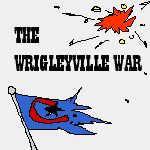
44. A Year in the Trenches
45. Surrender
46. Cubs Beat Cubs!
47. Cubs Bear & Grin It
48. Zellfish
49. Dead Heat
50. Pay Like There Is No Tomorrow
51. Lights Out
52. Zellzilla!
A YEAR IN THE TRENCHES
April 1, 2007
There was an uneasy truce during the 2006 season. Th neighborhood had been promised certain concessions, the roof top owners had been compromised into revenue sharing, and the city had not condemned Wrigley Field despite huge chunks of concrete falling from under the upper deck.
So most of the attention was on the actual baseball team. The Dusty Baker Boys continued the choke hold slide from 5 outs from the World Series in 2003 to sinking below the lowly Milwaukee Brewers in prospects and prosperity in 2006. For the third year in a row, Cubs management refused spending large sums on free agents while hoping that its own players, Kerry Wood and Mark Prior, would return to world class form. Wood and Prior had been becoming the post boys for hard throwing, bad mechanics, disabled list, towel throwing disappointments. So 2006 was the year of the shotgun youth starting pitching cycle. Sean marshall, Rich Hill, Angel Guzman, and a host of other lesser known names were rushed into big league starts with consistently poor results. Short innings, which led to taxing of the bullpen, which led to a quick slide to the cellar. The season was lost when Derrick Lee broke his wrist, and Aramis Ramirez could not hold the middle of the batting order. The team sunk like a cinder block attempting to surf on Lake Michigan. Baker merely sat in the dugout whittling toothpicks like a zombie beaver. The country club atmosphere of the Baker regime was beginning to gnaw on Cub fans. The pampered players were getting hurt, or not performing well, or making bone head plays in the field game after game. Batters refused to take pitches. Batters could not get a bunt down. Defensive play, especially in the outfield, was little league poor. And base running blunders multiplied without a peep from the coaching staff.
By the end of the 2006 season, the whiff of garbage within the Friendly Confines had turned into empty seats in September. The honeymoon with the White Sox championship and sell-outs at Comiskey Park on the South Side must have finally begin to embarass the Tribune. Especially when arch rival, the St. Louis Cardinals, won the World Series after only winning 83 regular season games. Only two games over .500 won the championship!! But the Cubs were not even close to competiting last season. In the end, Baker was terminated (not renewed) and Cub President Andy McPhail resigned. The Cubs PR director took over as interium club president.
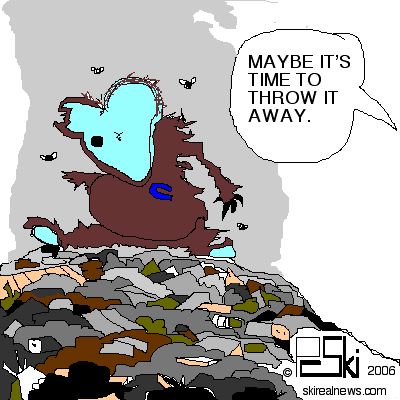
It was time to take out the trash. The new Cub management promised forcefully at the McFail press conference that the sole goal was to win the championship. Period. There would be no obstruction to that goal.
It was a promise that the fan base had heard since the Tribune acquired the team in 1981. Little had changed under the Tribune stewardship. Each spring held the eternal promise of success, but by the 4th of July, reality had buried the promise.
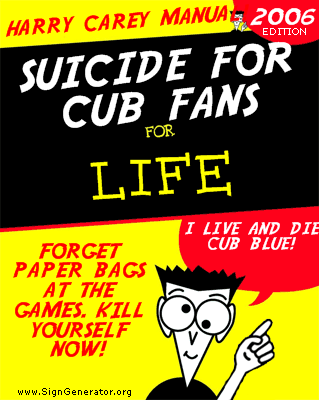
But there was other pressing problems at Tribune Tower in 2006. A major shareholder, the Chandler family (the former owners of the Times Mirror group that the Trib acquired in 2000) wanted out . . . a return on their investment with the Tribune was lagging behind the go-go stock market. The Tribune, like most media conglomerates, has been battered by declining advertising revenue, lower ratings and circulation, and declining demographics. Of all the problems, the revolt in the Board Room would take center stage.
The Cubs had suspended the Wrigley Field annex construction. The new parking deck and retail center next to the ball park was supposed to begin after the 2006 season. But the team canceled all work which led to the rumors of the Tribune being in a cash crunch. The focus of the board clearly was directed on the future of the entire media empire.
While Tribune executives were dodging the attacks of the Chandlers, the Cubs management went on the biggest free agent spending spree during the Winter meetings. The Cubs spent $300 million on free agents. The huge sum caught their ire of other owners and the commissioner's office. Suddenly, marginal .500 career starting pitchers were commanding $10 million in the market. After 20 years with middle of road ownership, the Cubs were suddenly throwing around Yankee-Red Sox money.
The spending spree was grabbing national headlines. Why did the conservative Tribune Corporation, under financial stress and a hostile minority board, approve such a lavish new baseball philosophy? One reason could be that the Tribune could not afford to lose its cash cow, the Cubs, to second class status in Chicago. Would Cub fans forget last season, the last decade, the last century by the signing of free agent Alfonso Soriano?
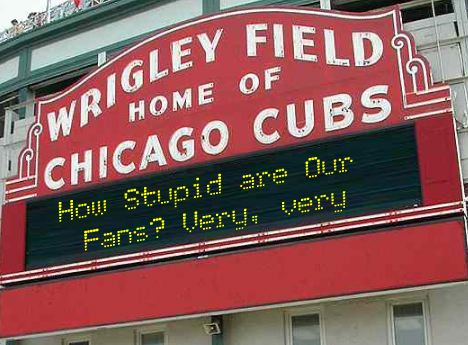
Another reason would be piling $300 million in team liabilities to make the Tribune Corporation less of a take over target. For months, the Tribune had been meeting with various groups as part of a reorganization review. First, large media conglomerates looked over the books and properties . . . and passed without a bid. Second, Wall Street investment bankers looked over the books and properties . . . and passed without a bid. Investment bankers could fall into two groups: one to keep the company whole, or one to unlock value by breaking up the conglomerate in pieces. Third, the Board studied reorganizing the company on its own, by spinning off divisions or selling assets. It also thought of borrowing billions to pay shareholders (the Chandlers) a large, special dividend. Fourth, unhappy with the progress of the company sale, the Chandlers put in their own bid for the Los Angeles Times group. Apparently, that did not sit well with Trib executives. Then finally, a couple of billionaires made bids for the entire company, using complex financing arrangements which had most business analysts scratching their heads. At the last moment, a Chicago real estate baron, Sam Zell, put in a bid for the company, similar to the other private offer. It took the Board back several more weeks to investigate the viability of the offers.
45. SURRENDER
April 2, 2007
Opening Day for the Cubs. A brand new season. But the morning news brought the statement that the Tribune Board had voted to accept the Zell proposal of taking the Tribune Corporation private, through an employee stock plan borrowing, and the eventual sale of the Cubs after the season.
The Zell plan calls for $8.2 billion price tag. Zell, a billionaire real estate tycoon, is only putting up $300 million in the deal. The rest of the price tag will be ponied up by the Tribune's 21,000 employees. The employees will have their their 401(k) shares converted into an employee stock ownership plan, a trust, which will use the stock to borrow $7.9 billion to pay off the other current shareholders. The last major Chicago area ESOP was United Airlines just before it went bankrupt with its pilots, attendants and mechanics losing their equity and most of their pensions. If interest rates go up, the ESOP will be under huge financial pressure of a default. It is a risky venture, on a conglomerate which has declining assets and revenue streams, with the risk being put squarely on the shoulders of the Tribune's own employees.
So in the end, a white flag was raised above the Tower. They have given in to a raider, a self proclaimed Grave Dancer, an investment vulture who will take control of the Tribune Corporation media properties without risking his much of his own capital. Zell, who has no journalism background, has the habit of taking distressed rental properties, jacking up income steams, and consolidate to sell off puzzle pieces at a premium. He has made a lot of money during his business career. But is unclear why Zell would want to own the Tribune properties.
He clearly will have the Cubs sold. It is the only premium property in the Tribune portfolio. The deal is also has regulatory hurdles, as the Tribune is in violation of FCC cross media ownership rules in many major markets, including Los Angeles. So the Zell management group would likely sell off the LA Times to the other unsucessful bidders from Hollywood. Also, the Tribune's cable property interests would most likely be sold to raise cash to pay down debt and interest payments. So in the end, the Tribune would appear to be a smaller corporation, with a high debt to equity ratio.
Since the Cubs are not part of the Zell solution, what is the battle plan for the Tribune's future? It is unclear whether Zell has a plan to make money in digital publishing. It is also unclear whether there will be huge cuts in personnel as the company goes private. It would be a harsh pirate code when the employees who own a majority of the new corporation have to approve the termination of their own in order to appease the bondholders.
One board room civil war has ended. Another one could be brewing on the distant horizon.
46. CUBS BEAT CUBS!
June 2, 2007
It only took two months of the Lou Piniella Experience for the Cubs franchise to hit an historic Rock Bottom.
Blue Lou left Tampa early because ownership was not committed to winning, and the players he had were continually making basic mistake (because they were young: AA and AAA level). But the youngsters in the dugout at least feared the manager's rath and tried to play hard, but could not play above their talent level.
Yesterday may have been the lowest water mark point on the Chicago Cubs in franchise history. Blue Lou is an old school observer of the game. He plans out a game ahead of time for moves in the 7,8, and 9th to attempt to get favorable match-ups. In his prior post game press conferences, he actually refers back to specific plays in discussing the game. Dusty Baker merely grumbled generalizations throughout his days at head honcho. During the Baker era, the players ruled the clubhouse. It was coined a country club atmosphere. Mostly veteran players for whom Baker would not prod, yell, scold or coach. Baker's philosophy was a ball player was a professional, and as a professional is personally in charge of getting themselves ready to play every day. Well, the players turned into a basic human trait: do as little as possible because there was no accountability or consequences to their poor play. They believed that they were valent knights, elite from the humble serfs who pay to see them play. And when anyone outside the locker room make a critical remark, the Baker Boys viciously verbally and physicially assaulted the broadcasters.
Piniella did not realize that this was the culture that he was inheriting when he joined the Cubs. He thought he was getting a roster of 23-24 experienced major league players who knew how to play the game. Instead, he got a slothlike, unmovitated, trust fund baby, Ivy league fraternity softball team. After a players only meeting two days before, the team continued is monumental run of little league goof-ups. Jacque Jones in center quits on a ball into the gap which hits on the warning track. He then twirls and throws a 40 foot relay into the turf so it skids toward shortstop. I know it was a catchable ball because I saw Pie track one down in the Cardinal series.
Alfy Soriano also let a ball go over his head to the warning track. He constantly has the problem that his first move off the ball being hit is a lateral one; outfielders need to make an immediate break toward the angle of the ball. Soriano loops in the outfield instead of a straight line intersection. Ryan Theriott loses a ball in short left in the sun. With sunglasses on and a clear sky . . . and playing ball nonstop for years as a kid and as an adult . . . . that's a basic play for a professional to make. Then Matt Murton calls off a back pedalling Mark DeRosa in short right. DeRosa quits, and the ball nearly hits Murton in the face as he misses it with his glove. That's another easy fly ball dropped by Murton. Then the play which is the poster for Cub futility. Barrett sets up outside of the plate. Zambrano, seeing Barrett is out of position, still throws a cutter inside. Barrett can't catch it. The runner on second is easily sliding into third when Barrett decides to throw him out. The throw sails over Ramirez and off the shortstop backing up the play. Another run scores from second without the batter putting the ball in play. It is the equivalent of giving the Braves an extra two outs to advance a runner.
In the parlance of old school, that's "dumb" baseball. And there runs the debate. The Cubs, for whatever reason, do not possess, or retain, any baseball intelligence. They don't know how to attack fly balls in the outfield. They don't know how to throw consistently or accurately. They don't know when to hit the cut off man. They don't know how to steal bases. They don't know how to advance on ground outs or fly outs with less than two outs. They don't know how to take leads without being picked off base. They don't know how to work a pitcher into a walk. They don't know when not to force a play -- which could lead to a bigger inning. And the players excuse is that they are "pressing" to win. If a player can only give 100%, and as a professional he should trying his best every day, it is impossible to "press" more than 100% effort. It is not pressing to do better that is the problem; it is that the players are not even close to playing at their personal 100% talent level. And that gets back to the pampered, unaccountable country club culture the Cubs players have enjoyed for a long time. This was sanctioned by Hendry and the Tribune . . . it was Steve Stone that got fired, not any of the players.
So after allowing five runs in the fifth, Zambrano comes into the dugout to blame Barrett's errors for the huge deficit. Barrett takes offense, and Z throws a couple of punches. Piniella breaks it up and sends Zambrano to the showers. During the Cub half of the inning, for some reason, Barrett goes into the clubhouse and the real bloody fight begins in earnest. So much so that the clubhouse trainer pops into the dugout. As he passes Lee sitting next to the tunnel, it is clear he says "there's a fight," and Derek Lee jumps up like being fired from a cannon and runs down the tunnel. The trainer gets caught up in the dugout mess, and pitcher Rich Hill is the one who apparently tells Piniella, who is sitting at the far end of the bench, that there is a problem in the clubhouse. Lou grinds his teeth and makes his way down the bench while the game is in progress. And that fact alone is the Exhibit A that this team is out of control. A players feud, status or personal feelings takes precedent over a Game in progress.
Afterward, Blue Lou is asked about it. He shrugs at the event as an old warrior; these things happen, you don't like them to happen on your team, and he will discipline the players the next day. But at the end of the conference, you can tell Lou's mind reverts to the argument he had just two days before in a two hour closed door meeting with McDonough and Hendry. He goes off on the fact that he needs major league players, and his team is not playing at a major league level, and demands that the team call up or get him major league level players. Someone who can catch the damn ball and run the damn bases. This has to be a slap at Hendry for sending down rookie center fielder Felix Pie. The two-hour meeting two days ago must have been a heated personnel review. Lou must have wanted massive changes, and Hendry refused because these are the players that Hendry signed or called up as his final general manager legacy. And president McDonough was there to get everyone to say "we're all on the same page here" over and over and over again.
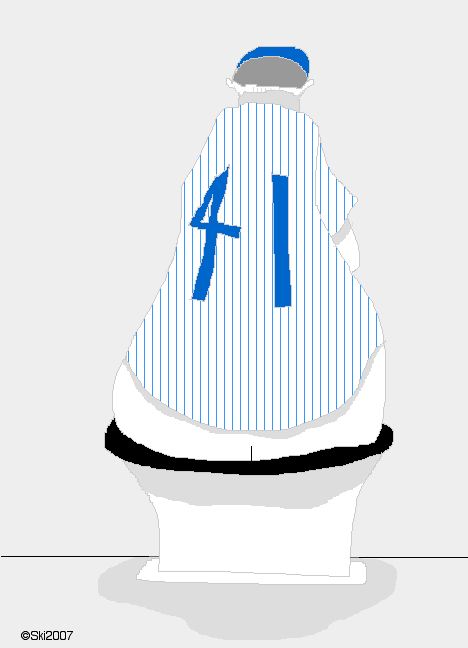
Blue Lou Piniella on the Cub bench.
Barrett met the media before Saturday's game. He looked like he was in a hard street fight. His right lip was swollen, his right cheek contused, and his left eye will blacken soon. He looked like he took a pounding but he just shrugged it off as Carlos being Carlos. However, Barrett is a tempermental player, too. Last season he sucker punched White Sox A.J. Pierzynski during a game. But players around the league have indicated that the Cub clubhouse has had simmering personality conflicts. Most of the Cub pitchers do not like how Barrett calls a game, or his defensive skill level. However, Blanco the back up catcher is an offensive liability. So the team is stuck with one of Jim Hendry's golden boy acquisitions, Barrett, behind the plate. Another long losing streak does not help diffusing the situation.
Based upon the current play the past few weeks, the following players should be sent to the minors, or have significantly reduced playing time: Murton, Jones, DeRosa, Barrett, Izturis, Theriott. But you can't play a game with only two outfielders and three infielders. And the musicial chair line up card is not helping Lou win games. It appears to be the only way to stop the players from grousing about lack of playing time by playing everyone part of the time. It also appears that Barrett has played his way off this team, and Zambrano will not resign with the club next season. So the most prudent situation is to trade them quickly before the Cubs are too far removed from the struggling Brewers. The Yankees are desperate for pitching . . . Zambrano could easily get one of the Yanks excess outfielders, a middle reliever and some minor league prospects. Barrett could get prospects from a team in need of an offense producing catcher. And catcher is something the Cubs have a surplus in AAA (Koyie Hill, the call up for Blanco, was #3 on the depth chart in Iowa. Soto and Reyes, who have caught half the starters already, are probably the future of the organization. But Hill was called up because he had some major league experience, something that Piniella is publicly crying for to his management.) But in the general manager world, it is too early to make big trades. The "white flag" trade of the White Sox still haunts the South Side of Chicago and it coined the phrase of surrender that every major league team executive avoids at all cost.
47. CUBS BEAR & GRIN IT
JUNE 17, 2007
It has been two weeks since the Cubs fought each other in the dugout-clubhouse. In the past two weeks, the league has been beating up on the Cubs. It started in Atlanta. Brave Edgar Renteria got hit with a pitch. He was upset and almost charged the mound. He took first base. When he was sliding into second, he delivered a forearm shiv that would have been a 15 yard unsportsmanlike penalty in football to the face of Cub second baseman Mike Fontenot. The play happened directly in front of the umpire, who did nothing.
The next night, Alfonso Soriano is hit by a pitch. Probably in retaliation. The final game, Ted Lilly hits a Brave with his 10th pitch of the first inning. Suddenly, he was ejected from the game to the astonishment of manager Lou Piniella. How could you know he was throwing at him? he asked the umpire. The ump said he just knew it was intentional So the Cubs were stressed out and went to their faltering bullpen to pitch 8 innings.
The team comes home to play the San Diego Padres. Alfonso Soriano hits a long home run. As he is getting out of the batter's box, he back pedals. The Padres pitchers call that showboating. Jake Peavy said if he was on the mound, the next batter would get a ball in the ribs.
The next game, Derek Lee of the Cubs is drilled high and tight by Padre pitcher Chris Young. Ball players fear getting hit in the head, which is where that fastball was headed before Lee ducked. Young claimed it was unintentional. Lee was walking to first while the umpire was in a discussion with the Padre catcher. Lee said something to Young, and Young replied --- and Lee barked back “what?”
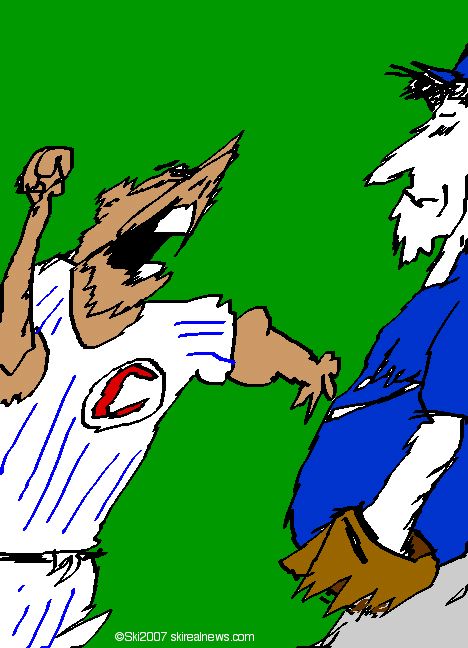
Lee then charged the Padre pitcher,like an angry bear, grabbing his shirt and throwing a punch (which missed). A few more missed roundhouses later, there was a huge pile up at home plate. In the ruckus, Piniella was chop blocked from behind and fell to the ground.
The replay shows that Young comment that set mild mannered Lee off was something to the effect if he was not hurt, go take your damn base. Both Lee and Young were ejected from the game. With Cubs power hitter Aramis Ramirez on the disabled list, Lee is the heart of the order. But he will be surely suspended by the league. Last year, Cub Michael Barrett got 10 games for sucker punching A. J. Pierzynski. Writers believe Lee will probably get at least five games.
Which will really hurt the Cubs. Zambrano was pitching a no hitter at the time of the brawl. He would lose the no hitter in the 8th inning, and the game in the 9th: 1-0.
Piniella has to be deflated. He has a bunch of AAA talent with A ball baseball IQ to use to try to manufacture wins. When he gets to home plate to hand in his line-up card in the next few weeks, it will be like he is playing the game with one hand tied behind his back.
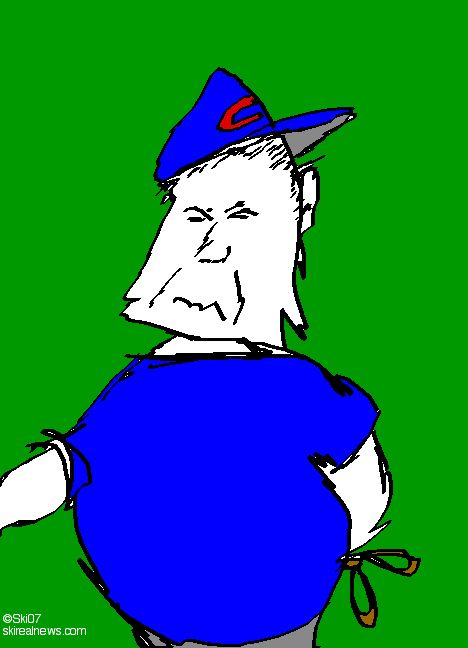
The on-field problems comes at a time when the off-field problems continue to mount for the organization. The Tribune's employee buy-out plan orchestrated by Chicago real estate tycoon Sam Zell has stalled; the FCC has not approved the needed waiver of cross ownership rules the Tribune wants in order to make the deal's collateral to be maintained for its loan guarantees. The FCC wanted the Trib to divest its Time-Mirror duplication, which still has not been done. In addition, the unions are beginning to digest the terms of the deal as if they got food poisoning at the company picnic. The high debt burden, and the probability of bank default makes the employee ESOP a high risk venture. The unions are also balking about the fact that the employees (the owners of the new company) have no say on who the ESOP trustee is going to be, now or forever. The stalled deal has also frozen any moves Cubs management can make on signing players, especially Carlos Zambrano, who joked last week that he would be moving on to St. Louis next season. That is like pounding a wooden stake into the heart of a bleacher bum.
ZELLFISH
JUNE 28, 2007
Tribune revenue has fallen another 11 percent. Its stock price has tanked below $30 per share, even though the Sam Zell deal mandated that the Tribune buy its stock back at $34.00 share in two tenders to close by the end of the year. But things are so bad at the Tower, that dissent major shareholder, the Chandlers, sold their shares at a 10 percent discount of the tender price just to get cash and run. If an insider bails before the deal closes, that is not a good vote of confidence for the business soundness of the deal.
The deal has been crushing the stock because the market and public are at odds with its economic viability. Employees do not like the concept of having their new ESOP own all the new stock but saddled with billions of dollars of debt. What really galls them is the fact that the employees cannot elect the trustee of their own ESOP. The investment bankers, who passed on buying the company and taking it private themselves, have balked at the amount of debt load the Tribune will have in the face of declining media revenues. Reports that the Tribune's bankers revisited the deal and asked for more fees and higher interest rates means that the structure of the deal is actually worse than originally reported by the Board.
The FCC has not ruled on the Tribune's waiver request of the cross media ownership rules. The Tribune is in violation of the FCC rule against concentrated media properties in markets. If the FCC rules that Tribune must divest themselves of radio-tv-newspapers to comply with broadcast licensing requirements, the viability of debt repayment (cash flow) could be compromised as revenue sources. And if the Tribune must sell, buyers will ask for fire sale prices for those properties, further compromising the business model of the plan.
The employees are upset with the deal, the bankers are leary of the deal, the public is waning on the Tribune properties, and the government may not approve it. For the local executives, Zell was the shiny white knight that rescued the company from the brink of the Chandler Family revolt. But in reality, this deal may be the dawn of dead for Chicago's media giant.
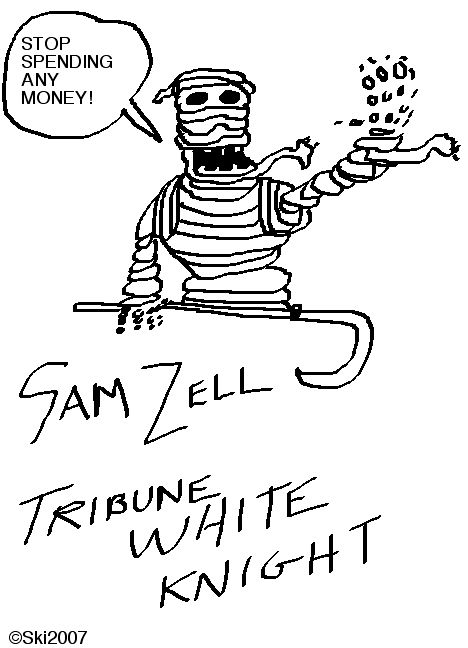
The uncertainty of the pending deal has impacted the Chicago Cubs in a strange way. The Cubs are not a stand alone division within the Tribune entertainment empire. The Zell plan calls for the sale of the Cubs. Period. Apparently, now there is a Tribune Corporate committee that must approve all major financial decisions surrounding the Cubs since the Zell deal was announced by the Board. General manager Jim Hendry tried to trade displaced outfielder Jacques Jones to Florida in a deal that had the Cubs paying $6 million of the players salary. As the Fort Lauderdale Sun-Sentinel reported, Sam Zell called his minions who called the Cubs management and vetoed the deal and the payment of millions of dollars in a player deal.
This move has outraged Cub fans. They find it unbelievable that Zell, who has no position yet in the company, and who will have no equity stake in the business, is calling the shots on how the front office should operate during the season. In fact, Zell is a minority shareholder in the White Sox. League by-laws forbid a person from having an ownership interest in more than one club, so Zell's alleged meddling is in direct violation of the baseball rules. It also smells like rotting fish that there was a rumor that the White Sox were interesting in trading for Jones, too. The blistering fact that an interloper is calling the shots when the new Cub president announced before the season that there would be no barrier to the Cubs winning a world championship, financial or otherwise. But the reins have been pulled in, like the noose around a condemned prisoner on the gallows.
In the past the Cubs were their own worst enemy. Ninety-nine years of futility. Now, in the midst of a six game win streak, an outsider is creating havoc.
DEAD HEAT
SEPTEMBER 9, 2007
It has been a grueling and hot summer for the Cubs and their parent organization, the Tribune. Tribune stock continues to trade at almost a 20 per cent discount to the Zell buy-out price. Wall Street specialists have as much faith in the Tribune righting its sinking ship as they do the Cubs winning the World Series.
There are times that Lou Piniella looks catatonic in the dugout. He can't believe the lack of baseball instincts his players show series after series: misplaying balls in the outfield, not hitting the cut off man, base running mistakes, missing signs and pitchers melting down on the mound. The Cubs job is probably one of the most pressure cooker assignments in sports management: Cub fans used to cheer for the lovable losers on the field while soaking up beer and the sunshine like it was a beach party, but no more. Cub fan expectations now rival those of Red Sox and Yankee fans. We are paying top dollar so we want a championship.
But 98 years of futility is hard to overcome. It was said that playing so many day games wears the Cubs out. In fact, the Cubs have more night games than ever. Also, the myth is wrong: it was the opponent players who used to feel the heat playing day games at Wrigley after a night on Rush Street. Chicago is a party town that never sleeps. For decades, the Tribune did not spend the money to create a winning culture. The Cubs were merely a television program for the Superstation, WGN. But when the Tribune decided to become a network, the Cubs became the program content stepchild and sent away to boarding school called local cable channels.
But with most of the Tribune decisions, the network one turned bad. It never dethroned any of the top four in ratings. And when the overall decline in television ratings and ad dollar losses, the Tribune was hard hit with the fifth network status. Now, with three straight quarters of double digit gross revenue losses, Tribune debt ratings, the key to the Zell buy-out bid, are now four times below junk bond status. Then lenders who committed to the Zell financing package are in their own credit squeeze, and will look for loan conditions to bail out of this project like the instigators, the Chandler family, did when the deal was approved by the board of directors.
During the turmoil, Cub management moved ALL IN by spending $400 million on player contracts in a last ditch effort to win the World Series. It is a huge gamble which has not paid off; the Cubs are tied with small market Milwaukee and just ahead of weak sister St. Louis in the standings.
The return of Kerry Wood was like injecting a cancer into your body. The fans had given up on Wood, the so-called next Roger Clemens. His annual disappointment has lead to top symptoms of why the Cubs never win. His return to the bullpen, but to only pitch one inning every other day at best, really destroys the manager's ability to use his 25 man roster effectively. You need rubber arms in the bullpen to pitch on a moment's notice; Wood's arm is - - - wooden. And when Wood has pitched, he has been inconsistent to bad. But the Cubs had marketed him as one of the star players, the team is trying to recoup its investment (to the detriment to the team.)
Lefty reliever Will Ohlman, unlucky number 13, has turned into this season's Kurt Mercker. Mercker and fellow pitchers during the Baker era routinely barked and screamed at broadcast critics after blowing game after game. When Ohlman was demoted to the minors, he refused to go; he claimed a mysterious arm ailment. He then railed against his fellow teammates and coaches. This is another cancer in the clubhouse; a self centered player who does not realize that losing is not acceptable anymore at Wrigley.
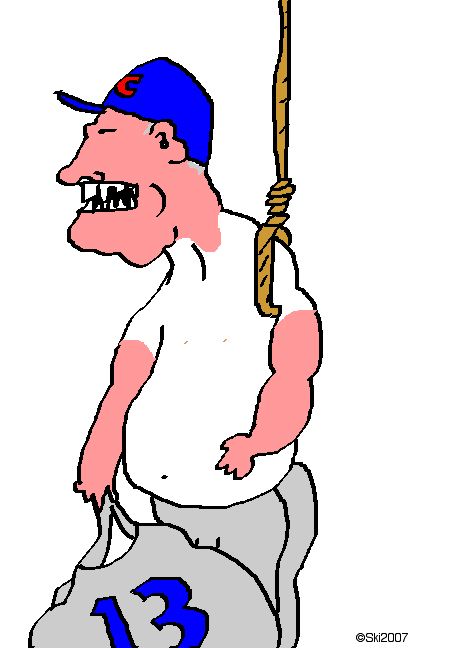
The National League Central is easily the worst division in baseball. The Cardinals won the division with only 83 wins last season on route to winning the Series. So anything can happen. During the early summer, the Cubs carved away at the early Milwaukee lead and took the head-to-head series to squeak into first place. The expectations turned to pure optimism. The Cardinals had a rash of injuries, no starting pitching, and Puhols was in a long slump. The Brewers were too young to hold off the pressure of the last season. The Cubs were now favored to win the Central.
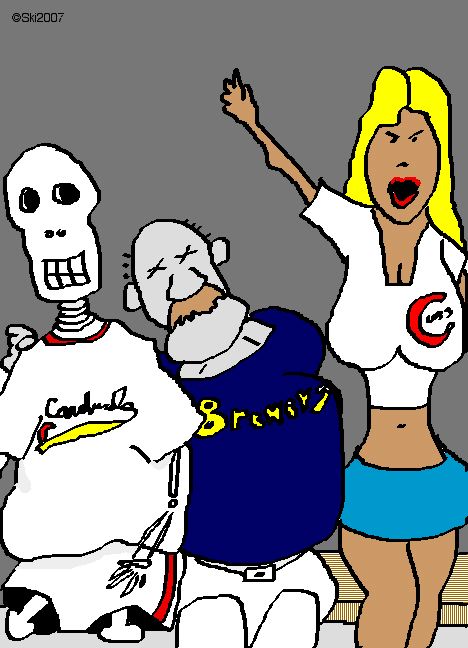
But how a few weeks can change matters.
Instead of streaking away with a divisional crown, the Cubs have see-sawed back and forth; one loss, one win, one win, one loss. Carlos Zambrano signs a big fat contract extension, then goes on to lose six games in a row. Suddenly, the Cardinals are two games back of the Cubs (with two extra games to make up at the end of the season).
On September 3, 2007, Zambrano was booed leaving the field after another poor outing. He acknowledged the boos by cupping his ear, but one could tell he was steamed. More than an hour after the game incident, he ripped the fans. He said he thought the Cub fans were the greatest in the world, but they are just in it for themselves. It was a demand that Cub fans cheer him no matter what the circumstance. He was demanding undivided loyalty and support from the people paying to see him lead the team to victories not a series of stunningly bad defeats.
But the outburst does show how professional players view their fans:
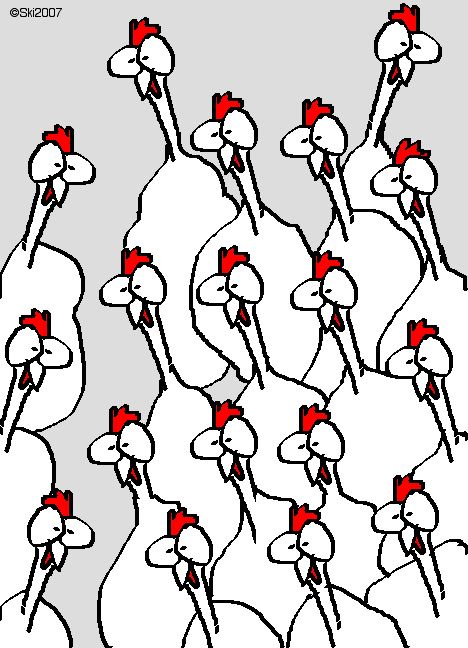
Like a flock and gaggle of chickens ready to plucked for their cold hard cash.
Outbursts like Zambrano's against the fans solidifies the increasing evidence that professional athletes are spoiled self-centered brats who lack common sense. The players have no urgency to correct their mistakes in the field. Trachsel proclaims he had a great outing, but he lost the game! Offended Cub fans view the Cubs increasing like this:
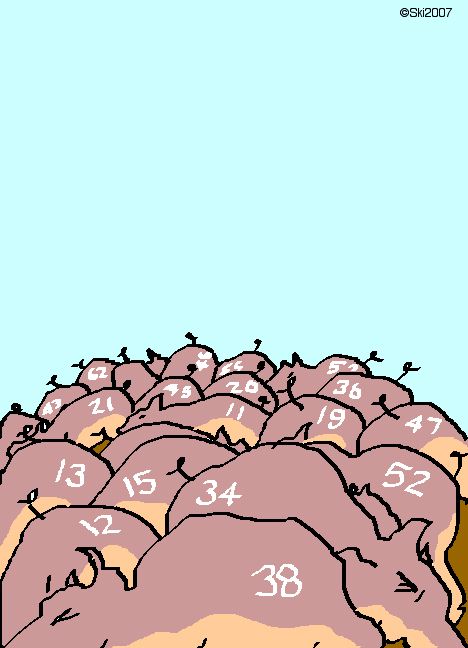
And the third part of the triangle, Cubs management, views the fans like this:

The media and fans jumped on Zambrano's comments with ire. The backlash was swift and unrelenting. It was so bad that the PR conscious President of the Cubs had a meeting with Zambrano and GM Hendry before the next game. Zambrano then came out to apologize for his statements, he claimed made in anger after a tough loss, but in reality made hours after leaving the game. The apology seemed scripted and monotone. Many fans did not accept it at face value. Most fans will keep Zambrano in the doghouse until he can pitch like the Ace he is supposed to be for this team.
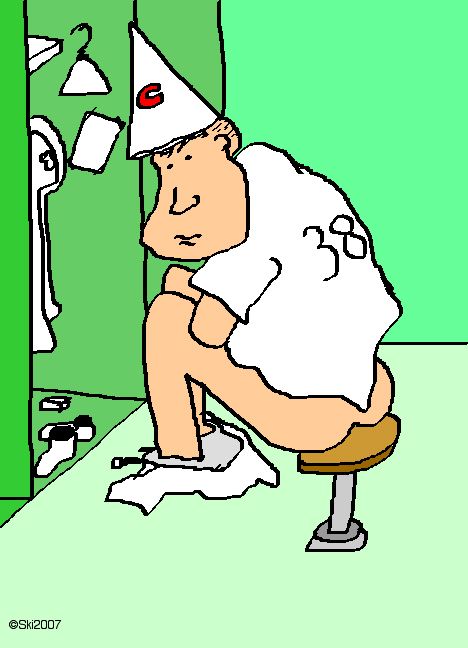
Even with Zambrano in the doghouse for stupid statements, and a glaring lack of command for a month of bad starts, the Cubs are still in first place. First place in the worst division in baseball is still first place, right?
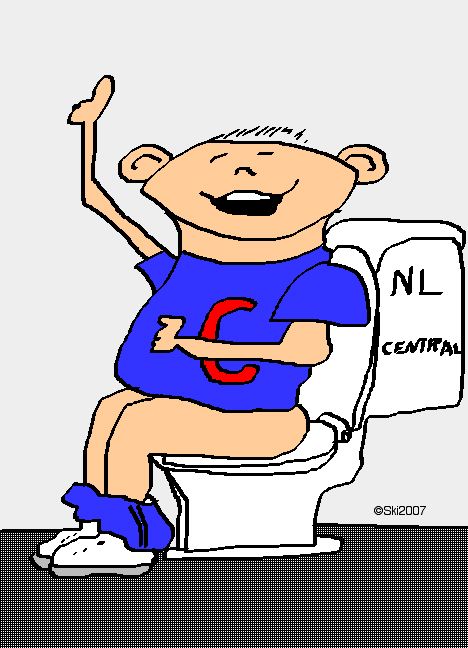
Yes, the Cubs still sit on top of the NL Central. But is that really saying that much?
Then adding Steve Traschel, an ex-Cub pitcher, to the fold in September is like the kiss of death for old die hard fans. Trax was bad the first time around as a Cub. You don't add ex-Cubs to a Cub team in contention. They have the loser disease. Traschel comes back into town as the self-appointed starting pitcher leader who will take the team's younger pitchers under his wing. The qualified veteran to do that was Greg Maddux, who is now pitching extremely well in San Diego. Trax takes the place of Sean Marshall, a tall lefty with looping curve balls, in the rotation which puts the bullpen in more of tight situation. Marshall is a starter all season; the transition to the bullpen would be worse than Wood's. The move smells of panic in the general manager and in the dugout.
Zell's financial buy-out of the Tribune is as tenious as the Cub Season. The mirrored self destruction is apparent in two camps. The Tribune is bleeding red ink that cannot be used for newsprint. Peter Gammons reported that the early summer trade of Jacque Jones to the Marlins was not vetoed by the Commissioner as the Cubs claimed. The league office required the Cubs to pay in cash the $6 million salary for Jones for 2008 to the Marlins that was part of the deal. In other words, MLB put the Cubs on COD. Other trades with other teams picking up next year's salary did not have the requirement of sending the cash with the player to the new team. The Cubs management and financial turmoil has put the team in the position of being unable to spend cash or make moves because the Tribune cannot afford them. This is the clearest signal that the league is worried that the Cubs as a franchise or the Tribune as a corporation, may not make good on their promises to other clubs in deferred cash in transactions. Bud Selig is protecting the other owners against the Tribune's possible bankruptcy, where executory contracts (promises to be performed in the future) can be voided as part of a reorganizational plan. (All the smaller deals made by the Cubs this season involved the team receiving cash - - - not giving cash away.) What will happen to the $400 million in player salary commitments is also speculation. There has been little movement in getting the Cubs franchise sold. Selig has been snail slow in reviewing potential bidders; again, protecting the league from having the Cubs sale be subject to a bankruptcy court sale like the Baltimore Orioles. For example, the league taking over the Cubs like it did with the Montreal Expos.
If you recall, Wall Street investment banks passed on buying the Tribune conglomerate and selling off the parts to make a profit. Vulture investors, like Zell, also passed at buying the Tribune for the same reasons. Zell is not putting in money as equity --- he is loaning money to the buy out plan to move his position higher in the repayment chart in any bankruptcy liquidation. No one has faith in the business model going forward for the old media companies like the Tribune. The only business segment that was actually growing was the turnstyle gate at Wrigley Field. But the Cubs franchise had been so beat up over the years, the players, the pressure and the pennant race may be another splinter that ruins the faith of the Cub fans.
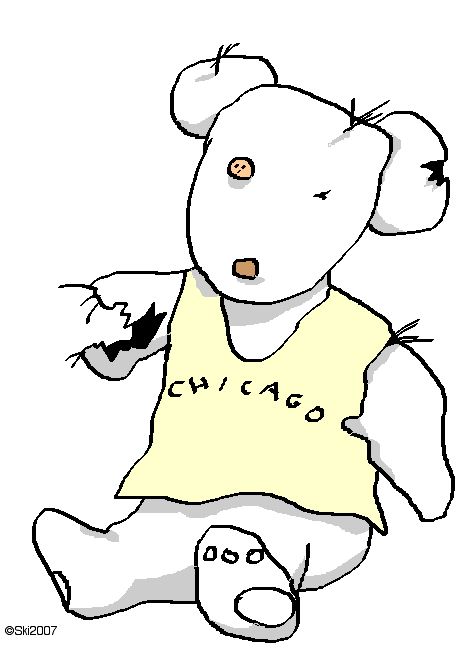
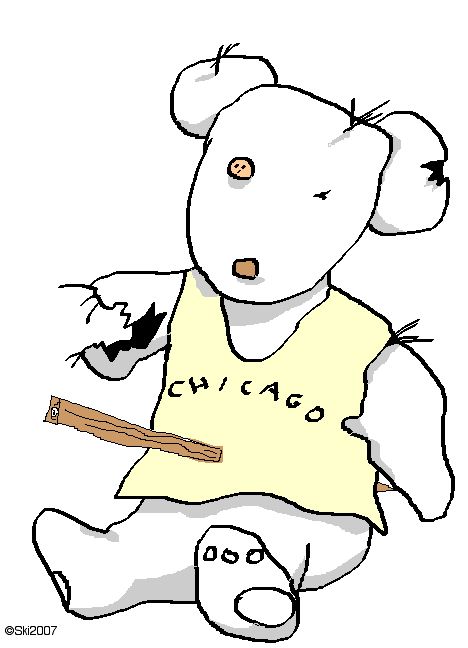
PAY LIKE THERE IS NO TOMORROW
OCTOBER 2, 2007
There is a large billboard promoting the Cubs. In large blue letters, it screams PLAY LIKE THERE IS NO TOMORROW. If that was the slogan for the 2007 season, it worked as the Cubs made the post-season.
But the real dollars will be spent in the post-season. The Tribune has not yet distributed the deal book to potential buyers of the Cubs. For a corporation desperate for cash, and announced early in the year that the Cubs would be sold in 2007, the snail pace of the team sale could mean there are deep issues. First, Sam Zell wants to shed all non-core assets to raise cash to pay down debt. Possibly some of the debt he would be loaning to the new corporation structure. Second, the bankers are balking at the continued double digit revenue decline the Tribune has reported so far this year. Declining revenue means more risk of repayment of corporate debt. The bankers could pull the funding if they believe that the collateral sours or the company does not have the ability to repay its loans. Third, the deal book will have to disclose accurate financials for the Cubs operations, including revenue and expenses. There has never been a separate break out of the Cubs revenues from the consolidated balance sheet of the Tribune. There were some head scratching during the Cubs ticket scalping trial on how the Tribune accounted for revenues from its ticket broker subsidiary. Fourth, there could be a large debate inside the company on how much Tribune debt to force on a potential buyer of the team. This could drive down the ultimate purchase price. Finally, the way the Cubs management spent $400 million in long term player deals last year, a new owner usually tries to cut expenses to cover the buyer's own financing debt.
If the Tribune's own bank deals unravel, then there would be no reason to sell the Cubs, a property that actually grew revenues in 2007 when it broke an attendance record to 3.25 million patrons at Wrigley Field, to be sold. Newspapers are in revenue decline, television properties have flat lined, but baseball teams continue to grow. So it is curious that the Tribune has not started the auction on the Cubs.
One economist remarked that if the Cubs actually win the World Series, the value of the team could actually decline. The reasoning was that the Cubs winning the championship would tarnish the Lovable Loser brand loyality of generations of fans. When teams win, the bandwagon jumpers will jump off when the team declines. For long time sufferers, when the team re-declines, some will wane interest because they already achieved their unattainable goal, that championship. Example, the White Sox, 2005 championship. This long season of futility will mean less fans in 2008 because the die-hards still remember 2005.
But if the team is going to be sold, the shareholders and bond holders will demand the highest price for the team. Major league baseball owners have a veto over the bid winner, and have in the past awarded a franchise to a lower bidder. The only time the owners were negated was by a bankruptcy judge who approved the auction of the Baltimore Orioles. And this is something that major league baseball dreads; a Tribune bankruptcy could cause an open auction of “unqualified” bidders. A true auction would cry out: PAY LIKE THERE IS NO TOMORROW!
LIGHTS OUT
OCTOBER 7, 2007
Former baseball commissioner Peter Ueberroth was in Chicago last week to berate Mayor Daley on the lack of progress in Chicago's bid to host the 2016 Olympics. He claimed that the mayor was falling behind the other Olympic hopefuls. But he may not realize that the mayor's Olympic dream is just another massive public works project he needs to keep his patronage army, his campaign contributors, and his loyalists fully employed, grafted and happy. It has nothing to do with public service, civic pride; it is an attempt to retain absolute power. The city is running out of land to build projects for the benefit of the public machine. The expansion of O'Hare into suburban turf is a political nightmare, and hundreds of millions of dollars overbudget without any progress. The city block across from the Daley Center in the downtown Loop is hitting the financial skids as the construction and financial markets hit the ropes. The Chicago lake front, with its center piece of Grant Park which was dedicated to remain free and open space, is under the mayor's bulldozer to create a new children's museum to angry outcry of open park advocates. The mayor does not care --- he needs these bloated public works projects in order keep command of his kingdom. This is not withstanding that the city is fiscally and morally bankrupt.
Away from the woes of everyday life, comes the entertainment venues to escape the riff-raff that eats away at the American psyche. The Chicago Cubs, the nation's lovable losers, backed into the playoffs by claiming the NL Central division. A September home run binge, plus a Brewer collapse, put the Cubs back into the post season for the first time since 2003. 2003: the year the team was five outs away from the World Series . . . and blew it. Badly. And made excuses, including blaming the fans, for their lack of performance.
Lou Piniella and $400 million spending spree by new Cub President John McDoogie, who took over for Andy McFail, would correct the ship. When he took the job, he proclaimed loudly that the single goal of 2007 was to win the World Series. For the Cubs organization and its parent, the Tribune Corporation, this was one last ditch Hail Mary passion play. The Tribune was for sale, and the Cubs would be sold off to the highest bidder in 2007. So the organization was allegedly spending the new owner's money (deferred) for the chance of ultimate glory of winning a championship after 99 years. By overspending with someone else's money, in order to get the glory for yourself . . . that is page out of the mayor's playbook.
So when the Cubs arrived in Arizona, the expectation was that a veteran team with a World Series winning manager, would take the Cub fans to the promised land. Generations of fans have been waiting in revered patience like Middle Age monks in a cold, damp castle. But Piniella and the Cub players failed to grasp the significance of the moment. This was a team that never connected with the 3.25 million fans that poured into Wrigley Field this season. The team was in their own little bubble. And the bubble burst with the lack of baseball fundamentals on national display. The team just refused to bunt a runner over; the team just refused to improve their outfield defense; the team refused to protect the plate with two strikes; the team refused to stop swinging for the fences when the situation called for punching a grounder to right field to keep an inning alive. Millions of Cub fans sitting and watching the Arizona series unfold were dumbfounded. This was the Baker era revisited and magnified to new levels of bad baseball play. One sensed the futility of the Cubs when Piniella was managing GAME 4 before Game 1 was even completed; there was no sense of urgency when the Cubs were not playing to score a single run, but waiting for the 3 run HR (which never materialized). When Piniella said that there was plenty of baseball to play after Game 1, some doubted whether he knew that was true. And when Piniella arrived in Chicago down 0-2 and began to talk about how successful the season was considering the poor 2006 record, rabid fans foamed at the mouth because win differential season to season had nothing to do with winning Game 3. And then, the fans felt like deck chairs on the Titantic when rich Hill threw that first pitch of Game 3. It landed in the right field bleachers. By the fourth inning, even the dugout had Cub players hanging their heads. The green cathedral of baseball had turned into the site of a community Wake.
Ueberroth also relayed a story. When he was commissioner, the Cubs made the playoffs. He penalized the Cubs for not having lights. He threatened to have all Cub post game season games at night, meaning they would be played at Comiskey Park. The Tribune was at odds with the neighborhood associations who believed the problems associated with the ball park in a residential area would be hazardous if night games were allowed to be played in Lakeview. So the Tribune played its mid-1980s sports gambit: the team would move out of Chicago if there were no lights. The Trib had sited at least three suburban locations: Arlington Park racetrack, a tract of land in Schaumburg (now the site of a minor league baseball field) and in Addison (a proposed site when the White Sox threatened to leave Chicago for the suburbs or worse, Florida, in order to get a new public stadium built on the south side). Ueberroth vetoed the Tribune's gambit under the guise that it would not be in “the best interests of baseball” to have the Cubs move out of Wrigley Field. He told the team owners to get the lights put in . . . period. And in 1988, the Cubs turned on the lights for the first time at Wrigley.
But with team ownership now in flux, the lights may be permanently out at Wrigley. No one knows if the new Tribune leadership will even sell Wrigley Field as part of the sale of the ball club. Actually, there is no guarantee that the Tribune will even complete its sale. If the current plan fails, then the Tribune is stuck with a team it cannot afford to keep. There is no guarantee that a new owner, who would be paying $700 million or more, plus assumption of at least $400 million in player contracts, could afford to stay at Wrigley Field when new modern ball parks create much more revenue sources. There is no guarantee that the new owner will not purchase the Cubs and move the team to the suburbs or out of state. The sacred level of Wrigley Field is an antiquated idea; if the league has allowed the Yankees to bulldoze the House that Ruth Built for a modern ball park, the league cannot object to a new owner doing the same with Wrigley, or worse.
Maybe if Ueberroth was still in charge, he would keep the Cubs wallowing in their own losing ways because it is the last historic thread to baseball's past. 1908. One hundred years. The institution status of baseball is confirmed by each time the Cubs last championship is mentioned in the press. The Cubs are the highway to the simplier past, the idealist early industrial American spirit, and the warm sun and green fields of past properity that our great grandparents fought for through two World Wars. If baseball wants to keep its historic tie to the distant past, then the Cubs should never win. The franchise is the last time capsule to the Game's early beginnings and legendary pioneers. And the story is the true American underdog saga.
But it was not in the interest of those at Addison and Clark Streets. Team management gambled their careers in a lame duck ownership season to win the championship. The team utterly failed in the first series. The players did not blame themselves; but put the cliche security blanket of time around them. The burden of losing became it. Piniella was spiking reporters who dared to second guess him in Game 1 by calling them SIR at times, an indication that he was patronizingly angry. In Game 3, LOU-SIR looked like a zombie managing a bunch of tee-ball kids. Any good will accumulated during the season evaporated on that hot Sunday afternoon. Instead of playing to win now, the players, coaches and especially manager were playing to keep their jobs for next season. For there may be no next season as they perceive it in 2008. And for the reaction of the fans to the Cubs post-season play, there may be little hope in next season as well.
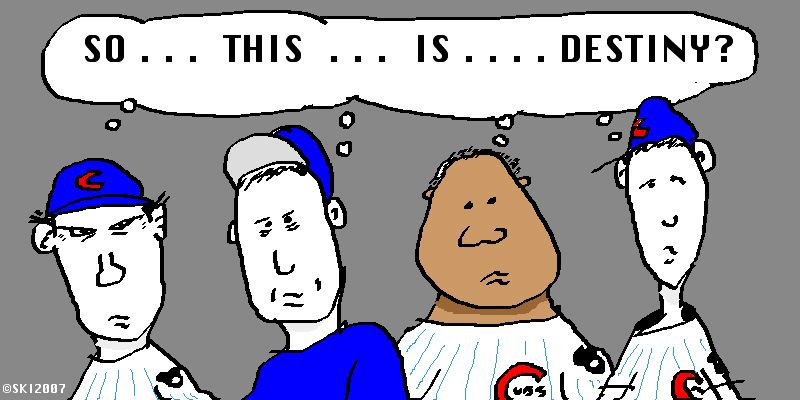
ZELLZILLA!
DECEMBER 23, 2007
The huge, deep, monsterous, evil groan that blew out windows along Michigan Avenue in Chicago this week was the opening sequence of a twisted melodrama of the Tribune leveraged buy-out closing. Real estate baron Sam Zell's plan to load up debt on a new employee ESOP in order to take control of the Tribune's assets, including the Chicago Cubs franchise and the green catherdral called Wrigley Field, was finalized in a final mad dash of fear, loathing and ill. The bankers balked at the debt load. The current board of directors feared being sued once the deal was done. Zell backdoored and lobbied to raise $500 million in cash from the Tribune coffers to reduce the $8.2 billion final debt financing. He took the $500 million on the balance sheet and spent every dime the Trib had in order to get control. Then, as the ink was still wet, Zell made the announcement that he would become the CEO of the corporation, something that was not part of the initial plan disclosures. The employees are aware that the worst is yet to come. The LA Times published in their first story of the deal closing that Zell “our new master.” Zell classifies himself as not an executive but “the new owner.” That is doublespeak for dictator because as a private company, there are no detailed regulatory controls of the SEC. And it is also doublespeak, because Zell never put a dime of his own money at risk as equity in the new Tribune. He borrowed all the money except his loan, which we hear after the closing may have also been borrowed from another friend and new board member. So, if the Tribune dies in a fireball of bankruptcy ruins, Zell has not lost a dime of his own fortune. But that being said, it is clear that he is scrambling to raise cash to pay back the money he borrowed from his friends and associates. The easiest target: the Cubs.
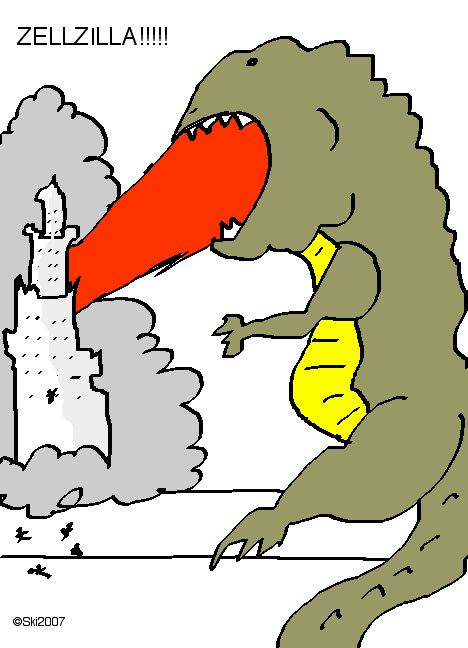
Zell has to have the deal close by the end of the year or it would have fallen a part. Wall Street had passed on buying the Tribune a year ago. Wall Street was rocked by a mortgage scandal of sub-prime fraud and defaults. The credit crisis had global implications as the US dollar sank to historic lows. Huge financial write downs by investment banks made the ability to loan corporate money more difficult. This was true with the Tribune's debt rating at two levels below junk status before the credit markets went down hill. But Zell kept the pressure on the bankers as the bankers began to balk at funding this risky deal.
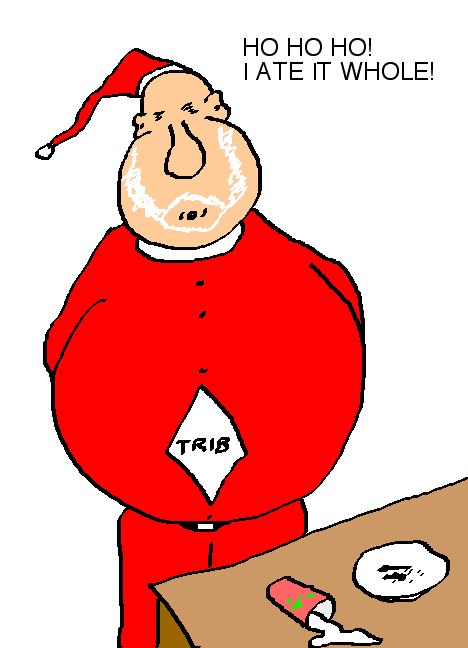
The key to this transaction was the Tribune's own employees owning the new private company. However, Zell has complete control over the Trustee of the ESOP. The true “owners” of the company are the employees: the editorial writers, editors, copy boys, delivery drivers, printers, salesmen and managers. But Zell has taken charge like a king banging the drum on his peasant flock. From his offices in the art deco former Chicago Daily News building, Zell spouted off some folksy profanity and called the newspaper business “ain't going away.” It has put shutters throughout the employee ranks.
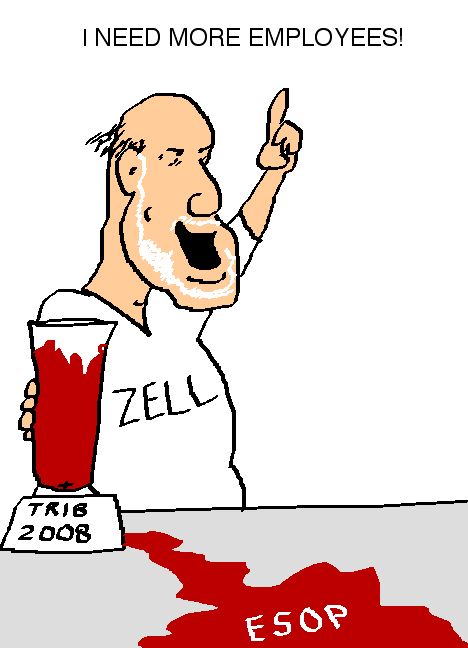
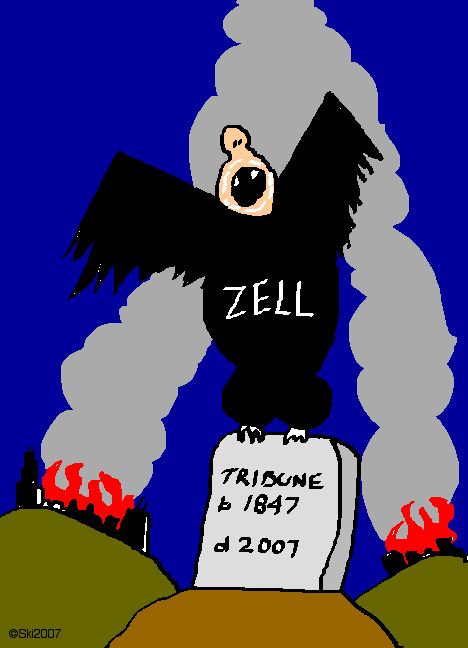
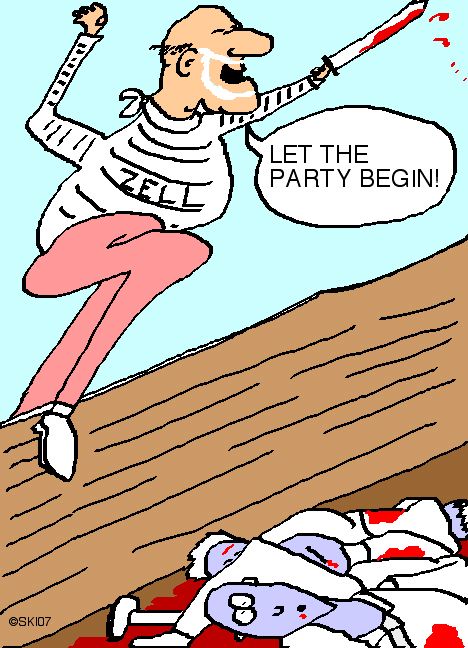
The Christmas bonus the Tribune employees received was $14 billion in debt, secured by their Tribune stock, and with the prospects of massive layoffs to cut costs. Before the deal closed, financial writers opined that there was insufficient cash flow to meet the proposed debt obligations. The bankers must have realized that too, because Zell had to pour in $500 million in Tribune cash to close the deal. How the Tribune grew its cash coffer from $180 million to $500 million is a real mystery story. Apparently, Zell, when he lobbied the FCC for a full waiver also lobbied the IRS to “refund $268 million fine” paid in the Times-Mirror merger tax liability. When the Tribune acquired the Chandlers Times-Mirror media properties, the IRS claimed and won a $1 billion tax award. The Tribune lost its appeal of that tax ruling. So why Zell, at the 12th hour got $268 million released so he could make his deal, raises a huge question. Without that sudden change in direction, the Tribune would not have the money in order to close the Zell deal. It would have been DOA.
More funny tax business is part of the transaction. Zell claims that the ESOP, as a non-profit, will not have to pay taxes so that should free up $420 million a year in cash. It assumes the IRS will agree with that assessment. It also assumes that there is cash dividends in order to pay expenses. The Tribune's gross revenues have been falling each quarter. Media companies are in deep recession. Advertising has fled to internet sites. Readership is declining. At first, Zell was classified as the white knight savior for the Tribune. Now, people are beginning to wonder.

Apparently, Zell rushed through the news room to make a pep talk to the troops. Most were not impressed by their new leader.
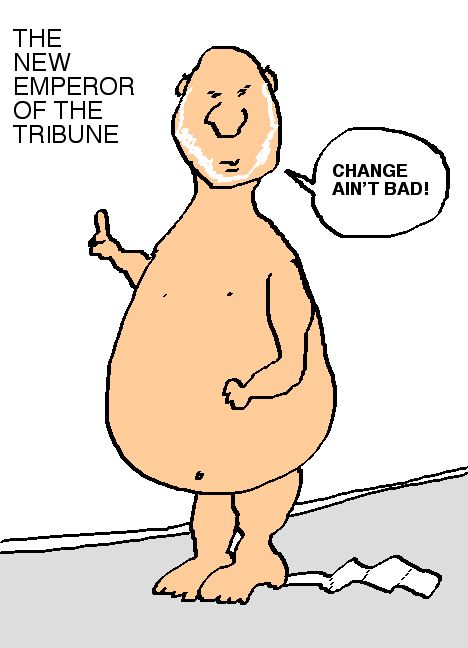
History may find this transaction as the Second Great Chicago Fire.
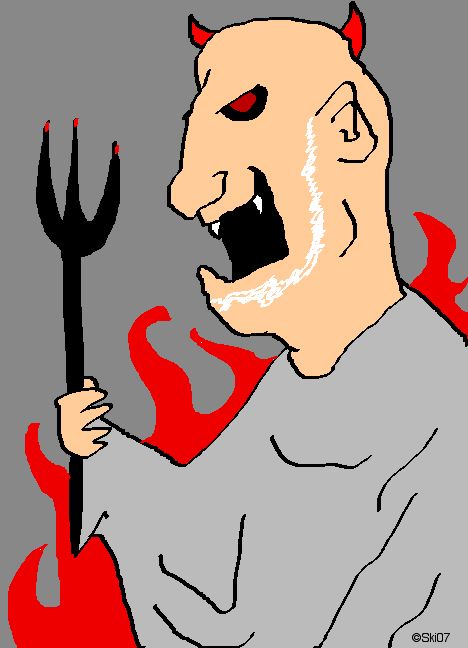
For months, we have speculated as to the motives of Zell to acquire a media company with no real media experience. His idea that the newspaper business is a viable, long term investment runs hollow. If he was so civic in his truths, so solid with his beliefs, he would have invested his own money and taken the company private without the employee debt burden. Zell is a real estate magnet. There is speculation that by gaining control of the Tribune, he is gaining control of the Trib's prize real estate assets: the Tribune Tower, the Freedom Center and Wrigley Field. It seems so shady even for the smoke room Chicago standards.
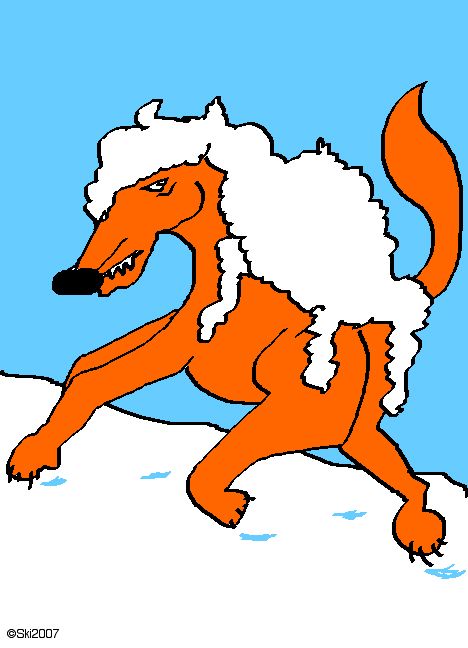
For the deal to work even in the short term, there has to be gut cutting. Bloody gut cutting. Zell claims to have the Cubs sold by opening day, March 31, 2007. However, he has not put together the deal book yet for potential bidders. Again, there is some fishy backroom business dealings going on.
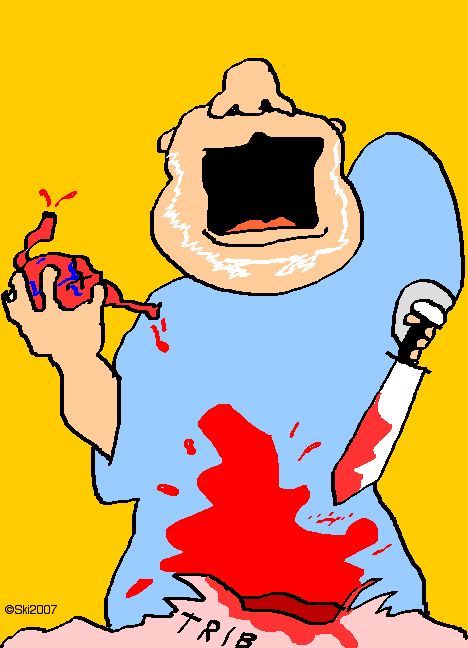
The Cubs continued to march through the off-season. Jim Hendry was so focused on a few things that may not have come true he turned into a cyclops. The blind idea that off-injured Kerry Wood would be the Cubs closer after only 24 innings pitched last season is insane. And then paying Wood a contract that would pay him more than current closer Ryan Dempster is clearly a slap on the bullpen.
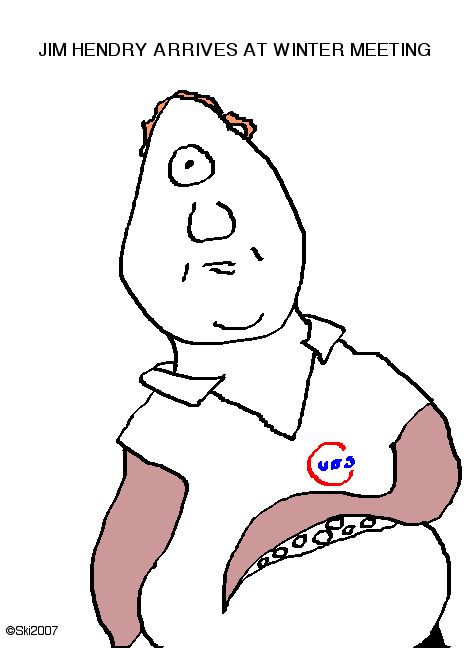
Hendry's goal was to acquire more second basemen than a team could handle. Also, to have players playing out of position like last season because his outfield corps was down to journeymen and prospects who have yet to perform. So his sights were on Japan's best free agent outfielder, Fukudome. But if one looks at his stats, Fukudome has a high strike out ratio. He really projects to a .275 hitter, with 17 home runs, 67 RBI and 15 SB in the majors. But Hendry thinks he could be the next Ichiro.
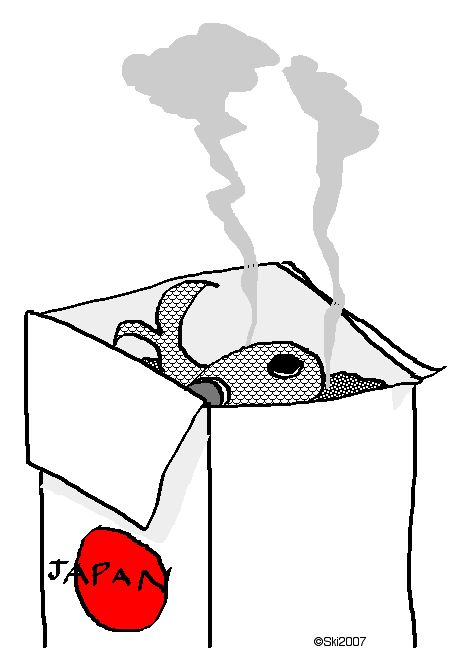
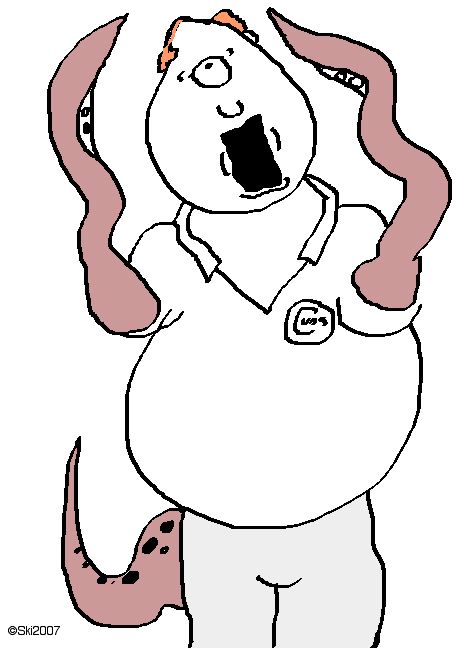
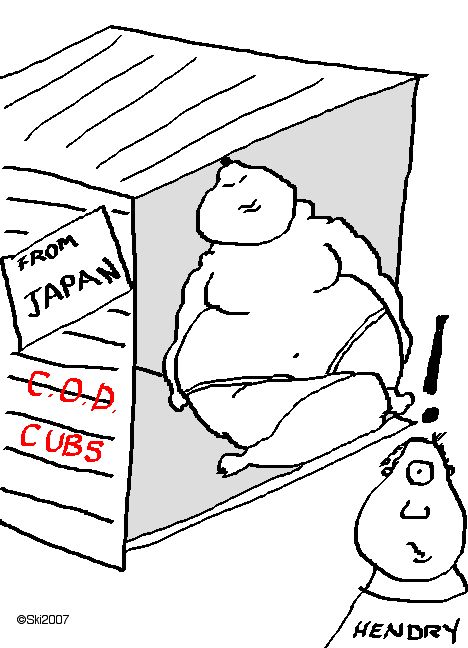
You can never tell how foreign players will translate into major league players. Japanese hitters play in smaller ball parks with pitchers who have less trick pitches. A monster contract can turn into a monster movie. But the Cubs have been operating for a full season on borrowed time and borrowed money; the new owner of the team will be saddled with a huge deferred payroll, a run down ball park, an agreement in breach with the City of Chicago on the bleacher expansion project, and a fan base that is growing increasing leary of the events occurring off the field.
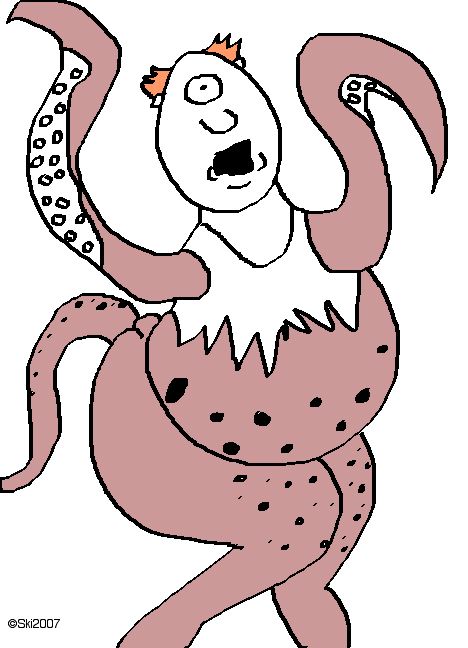
Zell has no interest in the Cubs. He is technically in violation of MLB rules because he is part of the ownership ground of the White Sox as a minority owner. But Bud Selig has not called him on the carpet; the Mitchell Report is occupied his days. And Selig's buddy, John Canning, has a bidding group with an inside track into the Cubs ownership. So much so, that an apparent conflict of interest exists between the three sides when it was reported that Zell, Canning and the Illinois governor discussed the prospect of selling Wrigley Field to the State of Illinois. The idea of the State, which can't finalize a budget, that is bankrupt financially, politically and morally, with a new round of federal corruption indictments pending, is shocking to the citizens as well as Cub fans. It was speculated here that the Zell plan could include selling Wrigley Field separate to the team. Apparently, there are eight different divesture plans involving the baseball assets. Selling the ball park is one option; having the State take over the yard is another. The terms made no sense: the State would get the park for $1, but then borrow $350 million to bring the park up to building codes. This means that the structural integrity of the 93 year old ball park is suspect. Two years ago, sections of concrete were falling from the upper deck. For $350 million, that means there is significant work to be done to bring the park to modern standards. It also means to most bidders, they would deduct $350 million off of their offer to cover those immediate expenses. So it means that the Cubs plus Wrigley will not generate the $1 billion Zell's group thought it was worth.
It also means that they are scheming to get some gold out of a lump of coal. By throwing the rehab expense onto the taxpayers through the State of Illinois, that is less cash lost. Zell gets a sweetheart lease from the State and then sells the lease to the Cubs, generating some cash from the buyer as the lease is an “asset.” But creating these new monetary contracts is going to get more difficult. Here is the conflict: the Tribune ran the Cubs and its broadcast rights as a consolidated division. No one ever broke out the true license fees and revenue figures. Now, a reason the deal book has not been done for bidders yet, is that the new “license and broadcast rights” agreements that the new buyer would have to accept are not done yet. How much Tribune corporate debt will be foisted on the new Cub organization? That will tell the tale. Since the deal book won't be out until January, 2008, there is no way that the Cubs will be sold by the new deadline of opening day. It will take at least 30 days for bidders to review the financial books and records to complete due diligence; major league owners will form a committee to review the bidders financials and make a recommendation to the full body; then the owners will review and have to approve the winner of the bidders. Unless the insiders will make the deal so only one bid group could qualify (another potential conflict), there is no fast track to this approval process.
Then the concept of naming rights for Wrigley was released in the media reports. Fans will immediately outraged at the concept of corporate greed renaming Wrigley as “Google Park” or “McDonald's at Wrigley Field” or “The New Enron Ball Park at Wrigley Field.” The nonsense of naming rights is the realm of marketing departments who spend money without creating a strong revenue stream. Most people call White Sox Park Sox Park or Comiskey before U.S. Cellular. Selling naming rights is a quick cash infusion by Zell into the Tribune coffers before the team is sold. But those deals are long term, annual payments of $1 million to $4 million a year for 20-30 years. Now, Zell could get sneaky and sell the naming rights but have it assigned to the Tribune to collect for the 30 year term like billboard operators do with signs on private property. Zell's spokesman never said who would collect such revenue. It was said that the new Cubs lease would pay back the State's bonds. So where would the naming rights revenue go to?
The blueprint is clear: Zell will do anything to raise cash. Employees are only pawns in the quest for cash. The Tribune's revenue sources have flat lined or decreased for more than a year. The deal to take the Tribune private is a risky adventure into the dark depths of corporate complex transactions. Since there has been no transparency in the Zell deal's terms, the general public is in the dark on what is really going on. The Tribune newspaper and the Cubs baseball team are in essence public institutions. The public will be the last to know what the terms will be and in reality, how much it will cost the public in the future.
See, also CARTOON MONSOON: FUKUDOME.
RETURN TO THE WRIGLEYVILLE WAR -- PART ONE
GO TO WRIGLEYVILLE WAR - - PART TWO
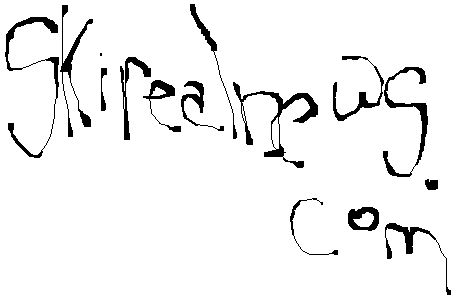
©2001-2007 pindermedia.com, inc.